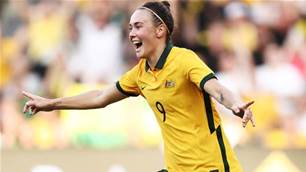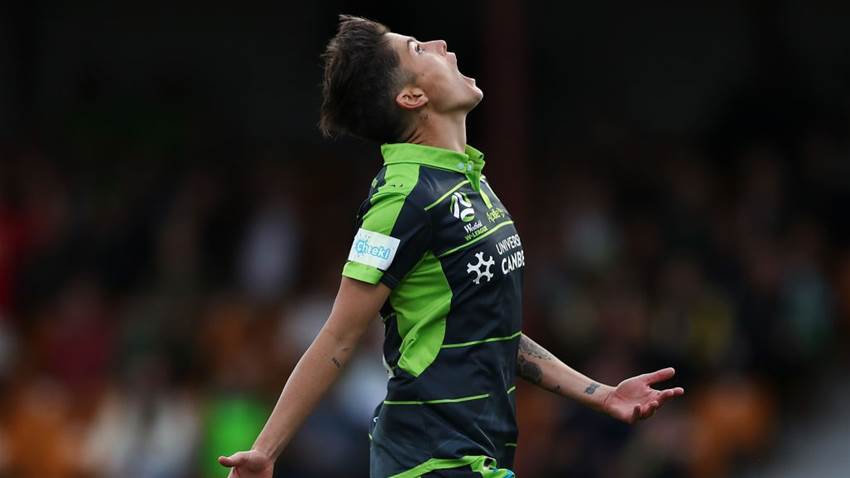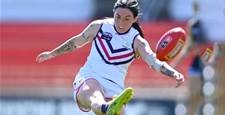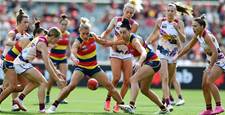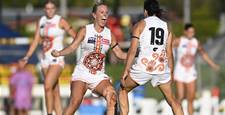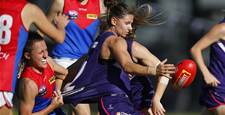There is a lot of focus on youth in the W-League, but Michelle Heyman winning the Julie Dolan medal after a year of retirement shows there are two sides to every story.
The Julie Dolan medal has often been awarded to young players who have burst onto the Australian top flight scene.
Kyah Simon won it at 20 years of age for her breathtaking 12 goal 2010-11 W-League season.
She did this a year after a 21-year-old Michelle Heyman scored as many goals as appearances with the now-defunct Central Coast Mariners.
The Dolan medal has rewarded prolific play, and has been the bounty of a largely young cohort of winners. This year’s Julie Dolan Medal did not follow this trend.
The winner was not a rookie who has recently burst onto the scene or a seasoned player in her prime. It was a veteran player whose W-League comeback is nothing short of breathtaking.
Eleven seasons after her first win, and one year after temporarily retiring from the sport, Michelle Heyman made an incredible return to the W-League with Canberra United. Speaking about her comeback she stated:
“It means a lot, coming out of retirement, to be able to put my boots back on and have some fun with Canberra United and to show that I’m still capable of playing.”
Heyman did not just show she is still capable of playing. Her leadership helped Canberra reach the W-League semi-finals, with her boots netting 10 goals in the process.
She finished second in the 2020-21 W-League season in goals, bested only by Matildas and Brisbane Roar forward Emily Gielnik.
Heyman received a total of 19 points to win the award, followed by Kyra Cooney-Cross & Emily Gielnik who both received 17 points, and Emily Condon and Cortnee Vine who both received 12 points.
This is Heyman’s second award of the medal, a record she shares with Clare Polkinghorne and Sam Kerr.
Heyman is also the oldest player to receive Australia’s top domestic soccer women’s award, and the only player over 30 to ever win it.
She has now become the top W-League scorer of all time, having surpassed Sam Kerr’s 70 goals by two.
When discussing her win and part of her reason for this comeback success Heyman stated:
"I think it's a big thing for myself but it's just the recognition that you enjoy playing football. You can always succeed and that's always been my motto. As long as I'm enjoying it, loving it and smiling, I usually play well and I think that's what we noticed from Canberra United this season."
Once again the W-League has shown that, despite its drawbacks, it is an essential aspect of Australian women’s football. It is a league all Australian players have to debut, to evolve, to come back to or in this case restart their soccer career.
Had Heyman been Canadian for example, where no league whatsoever exists, there would have been no space for her to return to play.
It is doubtful she would have been able to restart her career, let alone explode back to such incredible form.
Heyman understands the importance of not just the W-League to Australian football but also the whole of the development pathways to it, the A-League and the national teams.
This is why she recently took up a posting with Football Australia. She was appointed the Football Australia’s Junior Program Officer.
She hopes to use this position and her passion for youth football to help develop the Australian junior footballing system, doing so through her new responsibilities with the MiniRoos and Sporting Schools programs.
This post-career move, which will partially mean a step back from the game, was an ambition that Heyman always wanted to pursue.
She hopes to help grow the game and change the current gap she identifies within junior football that results in lost Australian talent.
After inspiring and thrilling fans on the pitch, @Mheyman23 is looking to influence the next generation of footballers from the sideline in her new role with Football Australia. https://t.co/S27VWUgplb
— Football Australia (@FootballAUS) June 4, 2021
Related Articles
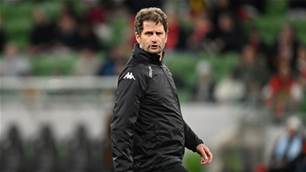
'Timing not right': Montemurro's verdict on Matildas vacancy
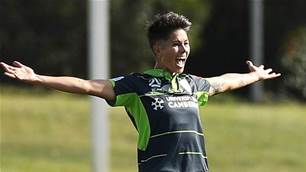
Heyman hits 100th goal as Canberra beat Adelaide in ALW
